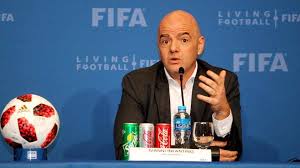By Paul Nicholson in Doha
December 14 – FIFA President Gianni Infantino concluded the FIFA Summits in Doha, Qatar, yesterday with what is becoming his trademark battle cry for an expansion of the 2022 World Cup to 48 teams and another reference to his being just another “citizen of the world”.
The FIFA Summits series are meant to be a discussion forum for FIFA to meet groups of its members and get their opinions and update them on FIFA activity. They increasingly sound like a sales pitch for Infantino’s global calendar reorganisation.
At a press conference held before he jetted out of the country – two days before the official launch of the Lusail Stadium design where the opening game and Final in 2022 will take place – he was a study in obfuscation.
“We have taken the decision to move in 2026. We favour the co-hosting option. We think 48 is the right number. Whether it is feasible to do the right thing, this is something we are analysing. We will discuss with Qatar, first partner,” he said.
So what is the right thing? His implication here is that he has already decided what the right thing is. So is it 48 teams or not? Is that really the right thing? How much thought has been given to the logistical requirements – beyond just saying it can shared with a few neighbours (perhaps with Iran and get the US to play in a group there?) – where is the commercial analysis, and what about the multiple player welfare issues in a World Cup schedule that is already shortened by three days?
One would like to think that, even with the executive brain drain that has taken place at FIFA under Infantino’s leadership, there are a team of FIFA boffins analysing all the variables, holding high level and meaningful discussions – certainly Infantino says ‘we’ are in discussion with “authorities in Qatar”.
This is a discussion really based around geo-politics with the elephant in the room always being the Saudi-led blockade of Qatar, a nation whose money Infantino is desperate to cosy up with.
Qatar’s support for Infantino would appear to mean very little. Football, like the region’s geo-politics, is a place where old friends quickly become your new enemies.
Infantino in his press conference he referenced a straw poll that was taken at the Summit. “We gather opinions of members,” he said. The majority are in favour (of expansion) – 50/60 countries being able to dream. 16 more to qualify with World Cup fever. Makes a big difference. Is it feasible or not, that’s the question. Is it feasible in neighbouring countries, maybe it’s an option. I’m not naïve. I know the news. But we are in football not politics.”
What he is actually saying is that ‘we’ are in politics. The 50/60 nations he refers to are presumably the 56 nations who were at the Summit, including 18 from Asia of whom only four have ever qualified for a World Cup finals.
This federation group was asked to put up their hands if they favoured expansion to 48 teams in 2022. Apparently only two didn’t, but it is akin to asking a group of turkeys if they would like Christmas to be postponed for a year. It is political hustings with an agenda already mapped out, hardly the resounding endorsement of a rigorous progression to sanctioning a 48-team tournament.
Infantino talks about an expanded World Cup bringing a unity to the region despite the complexities of the Gulf state relationships. But while he talks of unity his actions are really only serving to divide the region – and conquer it.
The humble citizen of the world still has a long way to go to find his global statesman credentials, or even acquire the diplomatic finesse of his now much-reviled predecessor.
The final decision on 2022 expansion will be taken in March at the FIFA Council meeting in Miami.
Contact the writer of this story at moc.l1745056724labto1745056724ofdlr1745056724owedi1745056724sni@n1745056724osloh1745056724cin.l1745056724uap1745056724

